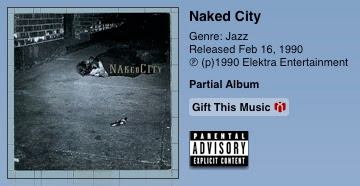preconcert
Does TA know everyone in this town?
Audience demographics: about 3-to-1 male-to-female, fairly broad age range (possibly not many below their twenties, however), predominantly white (although I’ve seen worse).
support act
That’s a
strange choice for a support band.
Do large (very much formal) venues have separate committees for the A and B acts? Do these committees program their acts largely independently, and
then try and match the acts as best as possible?
I enjoyed performances by this band in the past, but I’ve brought the wrong set of ears tonight.
MLM’s comment: “I’d hate to be in their shoes.”
Oh god. I hope those balloons weren’t meant as a homage.
main performance
I am so glad I could witness this. [Warning: upcoming tasteless comment]
I am in the presence of giants.Interesting tactics: elements that ‘sound’ serendipitous are actually prepared, each musician picking-up on, and capitalizing on, cues from the other, (retroactively) making it sound like their individual gestures are internally consistent while ‘magically’ matching each other’s.
I know a lot of their moves. Not enough for it to be useful if I were (heaven forbid) on stage with them, and certainly not in the way they can (ir)rationally respond and anticipate each other, but, nonetheless, I know a lot of their moves.
I wish my students were here.
Wow.
Wow! That was cool!
They’re using a tape…?
Is that a tape part…?
…no…?
…that’s the clarinet?!?
Oh. My. God. If you can do
that with a clarinet, why would anyone want to (or be compelled to) use a
laptop?
I
am in the presence of giants. [Apologies for that second tasteless outburst.]
I am lost in the moment.
Questions: does being in the position of having played with the two nominal ‘leaders’ (with formidable egos) put you in the position of negotiator / mediator? Does that position endow you with privileges / powers / controls / responsibilities—look one way, one possible ensemble; look the other, another?
Power flows though the negotiator. MLM: “But he’s hardly playing anything.”
This is dense:
compelling,
complex, and flying dangerously and dramatically close to the
moosh.
I see logic in the choice of reeds. During this dense moment, a sopranino will hover far, far above the rest of the ensemble’s sound space, out of everyone’s way.
How the hell do you break out of this
noise? What could possibly put the breaks on this system without creating
an anti-climax?
That’s how.
A ‘false’ ending, and / but a little
tactical flourish to put the breaks down. (And—feels almost magical—the audience conspires on this ending.)
Man, it doesn’t get much better than this.
final comments
MLM: “So many people walked out.”
I recall AF (a fine sound engineer for this and related genera of musics) critiquing engineers who mix with the expectation of a foreground (solo) and a background (accompaniment). Same problem dogged some of the earlier moments of this performance.
Flatten the levels and let the audience do the mixing.
 Incidentally, the partial album (22 out of 26 tracks) is available on iTunes (with the complete album promised). Comically, this comes with an “explicit content warning” label which, I presume, is for the album artwork rather than for Yamatsuka Eye’s vocalese (but, hey, what do I know; I have no window into the workings of the RIAA). At ¢99, and clocking in at 2' 20", ‘Snagglepuss’ works out at just over ¢1.4 a second. That’s not much byte-for-your-buck, but much better than paying ¢9 a second for one of the 11 second tracks.
Incidentally, the partial album (22 out of 26 tracks) is available on iTunes (with the complete album promised). Comically, this comes with an “explicit content warning” label which, I presume, is for the album artwork rather than for Yamatsuka Eye’s vocalese (but, hey, what do I know; I have no window into the workings of the RIAA). At ¢99, and clocking in at 2' 20", ‘Snagglepuss’ works out at just over ¢1.4 a second. That’s not much byte-for-your-buck, but much better than paying ¢9 a second for one of the 11 second tracks.